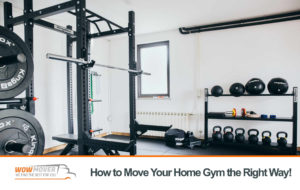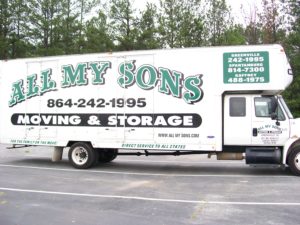How Inflation Has Affected Moving Costs in the United States
October 26, 2023
United States has experienced significant changes, and one area where the impact is felt profoundly is in the cost of moving. Whether you are planning an interstate move, looking for storage options, or simply trying to find the best deals on moving materials, the effects of inflation have created ripples that touch every aspect of the moving process. In this article, we will delve into the ways inflation has influenced moving costs and explore practical solutions for individuals and families navigating these challenges.
Inflation, the steady increase in general price levels, has become an integral part of the American economic story. The impact of inflation is far-reaching, affecting everything from groceries to housing, and of course, moving costs. As inflation rates soar, the expenses associated with moving, both locally and across state lines, have witnessed a notable uptick. This trend is particularly evident when considering interstate moving, where costs are influenced by fuel prices, labor expenses, and demand-supply dynamics.
Intestate moving, the process of relocating from one state to another, has become notably more expensive due to inflation. Fuel costs, a significant component of interstate moving expenses, have seen a sharp increase, directly affecting the overall cost of transporting goods over long distances. Additionally, labor costs have surged, reflecting the broader economic shifts in the job market. These factors, coupled with the rising costs of maintaining a moving vehicle fleet, have led to higher prices for interstate moving services.
One innovative solution that has gained popularity amidst rising storage moving costs is the utilization of moving pods. These portable storage units offer flexibility and convenience, allowing individuals to store their belongings securely without breaking the bank. Companies like PODS have revolutionized the storage and moving industry, offering cost-effective alternatives for those seeking storage solutions in an inflation-driven economy.
When facing escalating storage moving costs, it’s essential to explore budget-friendly options. Moving pods not only provide a more economical choice but also offer the convenience of on-demand storage. By opting for moving pods, individuals can store their belongings for a specific duration, mitigating the financial strain caused by inflation. Moreover, the accessibility and security offered by these units make them a practical choice for those in need of storage solutions during a move.
One often overlooked aspect of moving expenses is the cost of materials. From boxes to packing tape, these essentials can add up quickly, especially with inflation driving prices higher. To counter this, savvy movers are turning to cost-effective solutions such as buying moving boxes in bulk. Online marketplaces and specialty retailers offer competitive prices, allowing individuals to acquire the necessary materials without overspending. By planning ahead and sourcing moving materials strategically, movers can significantly reduce their overall expenses.
In the realm of moving, timing can make a substantial difference in costs. As inflation continues to impact the economy, choosing the right month for your move can result in significant savings. Historically, the moving industry experiences fluctuations in demand throughout the year. Understanding these patterns can empower individuals to make informed decisions. Moving during the off-peak season, often in the winter months, can yield substantial cost savings. By avoiding the peak summer season, characterized by high demand and consequently inflated prices, movers can stretch their budget further.
In conclusion, the effects of inflation on moving costs are undeniable. From interstate moving to storage solutions, every aspect of the moving process is influenced by the economic shifts in the country. However, armed with knowledge and strategic planning, individuals and families can navigate these challenges effectively.
Utilizing innovative storage solutions like moving pods, sourcing materials wisely, and choosing the optimal time for the move are practical strategies that can make a substantial difference. By adapting to the changing economic landscape and exploring budget-friendly alternatives, movers can ensure a smooth transition without breaking the bank.
Remember, staying informed, exploring innovative options, and planning ahead are the keys to managing moving costs in an inflationary environment. By making smart choices and leveraging available resources, individuals can successfully move to their new homes while keeping expenses in check.
For more insights into managing moving quotes, costs and navigating the complexities of relocation, visit WowMover. Explore their comprehensive guides and expert tips to make your move a seamless and affordable experience.
Moving to a new state can be an exciting adventure, but it also comes with its fair share of challenges and considerations, one of the most crucial being the cost. In this article, we’ll break down the various factors that contribute to the cost of an interstate move, helping you prepare financially for your upcoming relocation.
The distance between your current location and the destination plays a significant role in determining your moving costs. The longer the distance, the higher the transportation expenses. Movers consider fuel costs, tolls, and time on the road when calculating this aspect.
The volume and weight of your belongings directly impact the cost. More items mean more packing materials, larger trucks, and possibly more crew members. Downsizing and decluttering can help reduce the load and subsequently lower the costs.
Deciding whether to pack your items yourself or hire professionals can affect your expenses. While packing yourself might save money initially, professional packers ensure proper handling and minimize the risk of damage during transit.
Services like disassembling and reassembling furniture, appliance servicing, and handling specialty items contribute to the overall cost. These extra services can be convenient, but they do come at an additional expense.
Moving costs can vary depending on the time of year. Summer is typically a peak moving season, leading to higher prices due to increased demand. If possible, consider moving during off-peak seasons to secure a more cost-effective move.
It’s essential to gather quotes from several reputable moving companies. This will provide you with a range of costs to help you make an informed decision. Ensure the quotes are detailed and include all potential charges.
Many companies offer in-home surveys to provide a more accurate estimate. During these surveys, a representative visits your home to assess the items that need to be moved and any potential challenges. This personalized approach results in a more precise quote.
Don’t just look at the total cost; understand what’s included. Some quotes might seem lower but lack essential services or have hidden charges. Compare the breakdown of services to make an accurate comparison.
Before packing, take the opportunity to declutter your belongings. Selling, donating, or discarding items you no longer need can significantly reduce the volume and weight of your move, leading to cost savings.
If you opt for self-packing, use appropriate packing materials and techniques to ensure your items remain undamaged during transit. Label boxes properly to make unpacking more efficient.
Consider the pros and cons of a DIY move versus hiring professionals. While a DIY move might seem cost-effective, professional movers offer expertise, efficiency, and peace of mind.
Protecting your belongings during the move is crucial. While most movers provide basic insurance, consider additional moving insurance coverage for valuable items.
If there’s a gap between your move-out and move-in dates, you might need to store your items temporarily. Factor in potential storage costs when budgeting.
Items like pianos, delicate artwork, or antiques may require special handling and incur additional costs. Make sure to discuss these items with your chosen moving company in advance.
If possible, choose flexible moving dates. Some days or seasons are less busy for movers, and they might offer discounts for choosing these times.
Shared moving, where your belongings share space with other customers’ items, can be a cost-effective choice. However, it might involve slightly longer delivery windows.
Don’t hesitate to negotiate with moving companies. They might be willing to adjust their pricing or provide additional services to secure your business.
Moving interstate doesn’t have to be financially overwhelming. By understanding the various factors influencing moving costs and implementing cost-saving strategies, you can navigate your relocation with confidence. Remember to research thoroughly, gather multiple quotes, and make well-informed decisions.
When a movement invariably crosses a national border or exceeds a radius of 100 miles, it is classed as an intergovernmental or interstate move. The approximate cost of moving between countries is calculated differently for shorter distances. Cross-border removals are generalized in terms of provisional costs and are subject to three important price criteria that work simultaneously.
For example, the cost of moving furniture is calculated on the basis of the weight, size, and texture of the furniture. The higher costs are calculated for more expensive items such as furniture or heavy items and the higher number of experienced packing and moving companies staff that are needed.
The cost of moving furniture also depends on the distance between the two houses, which remains a constant value. When parts of the furniture are dismantled, the cost of moving is correspondingly higher, so we focus on these next two factors. The cost of moving furniture also depends on the number of experienced packaging and moving companies and the quantity of furniture.

How much the shipment weighs will play an important role in the final relocation calculation, so choose only the relocation service you need. Make sure you reduce weight by getting rid of things you don’t really want to use in the future.
Related : Should I Sell Everything before I Move?
1-bedroom apartment. The cost of moving out from a 1 bedroom apartment to a new home located 500 miles away is around $1500 while moving to a new address 1000 miles away should cost you roughly $2000. Both these prices have been calculated for a shipment weight of 3500 lbs.
2-bedroom apartment or house. The average moving costs for a 2 bedroom apartment or house are roughly $2000 (500 miles) and $2500 (1000 miles). Both costs have been approximated for a shipment weight of 5000 lbs.
3-bedroom apartment or house. The average moving costs for a 3 bedroom house or apartment are approximately $2600 (500 miles) and $3500 (1000 miles). The shipment weight for both values has been rounded up to 7500 lbs.
Related Articles:






How To Cut Cost for Home Relocation? Moving to a new house may be expensive, especially if you don’t plan ahead of time. Furthermore, even if you have everything planned out perfectly, you may encounter unforeseen costs during your relocation. Trying to save money while moving is about more than simply cutting prices; it’s also about avoiding unneeded extra expenses. You’ll find all the information you need to save money on your relocation right here.
Also, Read: Guide on How to Budget your Move in 2022
Organizing your move and saving time is one of the greatest methods to cut moving costs. Put your pen to paper as soon as you realize you need to relocate and develop a list of everything you need to do. “Time is money,” as they say, and the sooner you plan your relocation, the more money you’ll save by the time it’s through because you’ve figured everything out.
With more time on your hands, you can better pick through your belongings to lower your load and, as a result, pay less to move fewer items. You also have enough time to identify the best movers and bargain with them to get their services at a reasonable price. If you wait until the last minute to hunt for packers and movers, you’ll be forced to accept any price they provide because you’re in a rush.
Every family follows a budget. That is the fundamental idea, and it is from this that we learn to preserve money and only spend when absolutely required. Applying the same method to your move can help you keep track of your expenses and prevent wasting money. However, you may need to be flexible because it is not always easy to find a mover who offers high-quality relocation services within your budget.
Also Read: Best Way to Prepare your Home Appliances before Moving
Preparing your equipment before moving day might also help you save money on moving costs. Dismantling appliances such as a refrigerator or an air conditioner may incur additional charges from packers and movers. They will also charge a small fee to deal with any leaking appliances that aren’t cleaned up before the move.
You could save money on disassembly by doing it yourself if you have the necessary knowledge and skills. If you’re not sure how to do it correctly, it’s best to leave it to the specialists, who will use the proper instruments and follow the relevant instructions to avoid any damage.
You should defrost the refrigerator, clean all of the shelves, and wipe it inside and out the day before you move. You can avoid spoiling and ruining your other items as a result of a leaking appliance by doing so.

Before you start packing your belongings into boxes, make sure you have a bag ready with everything you’ll need to get through the first few days in your new home. All of the necessary amenities, clothing, cleaning supplies, and, most importantly, your valuables and vital documents will be stored in your survival kit.
You should never send your important documents and valuables, such as a laptop, jewelry, or ornaments, with your usual household goods to be moved. These objects are far more valuable than money and can never be replaced. Always be cautious about what you send with the movers, and keep precious items close at hand.
Sorting through your belongings and separating the things you don’t need anymore is one of the most important things to do while preparing to move. The rule to remember is that the fewer items you bring with you, the less you’ll have to spend. So, the simplest method to save money on moving costs is to get rid of items you haven’t used in a long time or are unlikely to need in the future.
De-cluttering not only saves you money on moving costs, but it also makes room for new things by reducing the weight you’ll have to transport into your new house. While you’re doing it, consider selling some of the stuff you don’t use for some additional cash. Alternatively, you might donate the useable stuff to the less fortunate and feel good about it.
Also Read: Garage Sale Helps you Lighten up your Load
Moving on the appropriate day and at the proper time will also help you save a lot of money on your relocation charges. The movers quote high fees over weekends and month-ends due to increased demand, since many individuals move during these times due to time off from work and the end of lease or rent contracts.
Moving during the week in the middle of the month is your best chance because it’s much easier to hire reputable movers at this time and you won’t have to pay hidden moving fees. They will also be able to devote their full attention to your relocation job rather than being in a rush to go on to the next one.
Disconnecting the utility services at your former house before you move out is another simple approach to saving money. This is one of the most common jobs that individuals overlook; they are unaware until their bills arrive and they are required to pay for services that they never utilized.
Set aside a day before your move to contact all utility departments, such as gas, electricity, water, tv and internet, cable TV, newspaper, milk vendor, and so on; inform them of your move and give them a particular date by which these services must cease or be transferred to your new site. If you can’t transfer your utilities, make sure you contact them at your new house and ask for them to start on the day you move in.
Using the services of a moving company may appear to be costly at first glance. However, you will actually save more money than you anticipated. You can save money on packing supplies, transportation fees, the protection of your belongings, and a lot of time and work by hiring a mover.
All of this, however, is only achievable if you select the appropriate moving company that provides excellent service at a reasonable cost. It would be ideal if you completed your homework on each mover’s trustworthiness before employing them. Because no two movers charge the same, you should receive quotes from at least three different companies. You may choose the proper mover who meets your budget and relocating criteria after reviewing their company profiles and pricing estimates and deciding who gives the greatest services.
All of this, however, is only achievable if you select the appropriate moving company that provides excellent service at a reasonable cost. It would be ideal if you completed your homework on each mover’s trustworthiness before employing them. Because no two movers charge the same, you should receive quotes from at least three different companies. You may choose the proper mover who meets your budget and relocating criteria after reviewing their company profiles and pricing estimates and deciding who gives the greatest services.
Related Articles:






How Much Does a 4 Bedroom House Moving Cost? Moving from one location to another is one of the most important decisions we make in our life. After all, getting out of your comfort zone and giving life a new start isn’t always simple. When we finally work up the confidence to move, the first thing that comes to mind is the cost of moving.
The price of a move is influenced by a number of factors, including whether you are moving to a different country, state, or city.
Because every relocation is different, there are no fixed costs in a moving program. If you’re considering a cross-country move or residential moving but are worried about the cost, keep reading to learn more about the elements that influence the ultimate cost of your move.
There are three ways to start a cross-country relocation. You may either rent a truck or utilize a do for your container, or simply hire a professional mover to take care of everything for you.
Renting a truck or trailer for a move of up to 1500 miles might cost roughly $3000 if you own a fairly furnished home. If you go with done for your containers, it might cost you roughly $4500 for a similar moving package.
If you opt to delegate the burden, professional movers can provide you with a detailed estimate of your whole moving strategy.
Useful Topics:

Take a step forward if you are sure of your ability to plan and execute your full move. You may find that renting a truck or trailer is a more cost-effective option than using a moving container.
If your contents list is short and none of them require particular attention, you can simply proceed with a do-it-yourself moving plan; however, if you have a large number of goods that require special attention, you should hire a professional mover.
If you manage everything yourself, taking on the whole responsibility for a cross-country move can give you restless nights. Even a minor blunder can jeopardize or derail the entire strategy.
Using a professional mover, on the other hand, can provide you with complete peace of mind because they will handle everything during your move.
A professional mover would typically charge roughly $7,500 depending on the size of your home and valuables. These fees may increase if you are transferring a four-bedroom home or decrease if you are moving to a two-bedroom home.
Your entire relocation operation is skilfully streamlined by professional movers. The majority of moving checklists and planning tools. Some moving companies additionally provide valuable items protection while in transit. Some even have storage choices so you don’t have to worry about clutter when you’re unloading.
Although professional movers are more expensive than alternative means of relocating, the peace of mind that comes with hiring them outweighs the financial cost.
Now that you have a better understanding of the various options and a reasonable estimate of the cost of a moving program, you can plan out your move to make it as simple as possible.
Related Articles::





